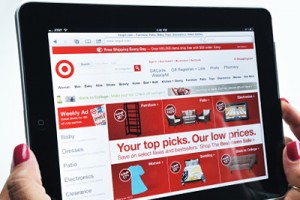Tablets are now nearly as popular as desktops and laptops for buying items on the web, according to data from web merchandising firm Monetate.
In the second quarter of 2012, 3.17% of tablet users on the web made an online purchase, while 3.34% made purchases from desktops and laptops, Monetate’s data shows.
“Tablets are truly a competitor for the desktop [and laptop], with web tablet users converting [to buy] at nearly the same rate,” said Monetate’s chief marketing officer Kurt Heinemann.
The average order value from a tablet in the second quarter also was larger than from a desktop or laptop, and much larger than in previous quarters, he noted. Tablet buyers spent an average of $96.11 for a purchase in the second quarter of 2012, while traditional web buyers spent an average of $91.86.
Total web traffic still remains much higher for desktops and laptops, but has grown dramatically for smartphones and tablets in the past year as more devices have hit the market, Heinemann said. In the second quarter of 2011, tablets and smartphones accounted for 6.53% of web traffic, but jumped to 16.08% in the second quarter this year.
“That is a major hockey stick in terms of growth,” Heinemann said. “We are now in the first stages of the Web experience moving to tablets and smartphones. We’re just hitting a boom. That 16% number will definitely go into the 20s by the first quarter of 2013.”
Monetate derived its data from an estimated 100 million e-commerce sessions. Monetate provides software and guidance to more than 150 retailers and other web merchandisers, helping them customise ad campaigns for better sales. The company works with such web retailers as Best Buy, QVC, The Sports Authority and Petco, among others.
The research shows that smartphones are principally used for researching products to buy, while tablets, which can be “more visual and more tactile” because of their large touchscreens, are easier for users in moving around a web site, Heinemann said. Smartphone purchases are only about a third as frequent as purchases made with a tablet, even though the average order value on a smartphone is slightly greater than with a tablet, Monetate found.
Monetate encouraged businesses that sell on the web to plan for adapting to touch-centric tablets as the devices grow in popularity and as a way to make purchases. One big difference with a touchscreen tablet over a pointer or mouse on a laptop or PC is that there’s no “mouse-over” capability with a tablet, whereas a pointer on a laptop or a mouse on a desktop can hover over something on a web page to make a ghost image appear with more detailed information. A user’s finger on a touch tablet can’t hover over something for more information.
Heinemann predicted that with the impact of the Google Nexus 7 tablet, which went on sale in mid-July, the smaller iPad tablet expected from Apple, and next-generation tablets coming from Amazon, there will be a “meteoric rise” in tablet use and purchasing.
He also predicted that Microsoft’s Surface tablets will be too expensive compared to the Nexus 7 priced at $199, and are already too “late to the dance” to have much impact.
While Monetate evaluates web traffic and web purchases, Heinemann said he’s keenly aware that apps used for online purchases are more appropriate for certain businesses that sell online.
“Travel is perfect for apps purchases, such as buying an airline ticket, but when businesses start going into areas for more broad retail needs, the web is still good,” Heinemann said. “We don’t think you’ll see as much retail app development. Browsing is losing share to apps [for purchases], but apps are not a major value for the core retailers out there.”






